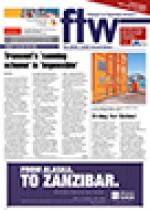In a recently published
report – which has proved
controversial in SA – the
World Bank (WB) has come
out in favour of e-tolls and
against the fuel levy as
the best means of paying
for the Gauteng Freeway
Improvement Project
(GFIP).
Its study on the subject
suggested that a fuel levy
was a possible alternative
but added that it was at best,
a “proxy for road use and
would need to be adapted
over time to take account of
vehicle technology change”.
The controversy that the
GFIP generated led to a
complete public rejection
of e-tolling. So big was the
objection that, in the first
two-and-a-half years of
e-tolling, compliance had
only been at an average
of around 25% to 30%,
according to figures released
to FTW by the Organisation
Undoing Tax Abuse (Outa).
This, said the WB
report, had reduced the
creditworthiness of the SA
National Roads Agency
Limited (Sanral) as a going
concern, and this opposition
had to be dealt with before
Sanral could pursue other
road infrastructure projects.
Wayne Duvenage,
chairman of Outa, disagreed
with the WB’s view. “The
problem with Sanral’s e-toll
scheme for Gauteng was the
excessive collection cost,” he
told FTW, “which consumes
almost 30% of the revenues
before one rand is used to
service the capital bonds.”
He added that
unfortunately for Sanral, the
low compliance experienced
had ensured that around
90% of the e-toll revenues
generated had been used
to service the collection
process. “Virtually nothing
has gone into the tarmac,”
Duvenage said.
He also stressed
that the fact that e-toll
compliance had remained
low throughout the first
two-and-a-half years was
a strong indication of why
the scheme was not fit for
its purpose in SA.
“In the context of an
environment where weak
regulatory administration,
combined with poor
enforcement and a high
propensity for poor public
co-operation on such matters,
the scheme was always going
to suffer low payment levels,”
added Duvenage.
He pointed out that,
on the other hand, the
fuel levy had a zero
administration cost,
as it was an existing
government policy and
enabled treasury to pass
on a portion of the levies
collected to Sanral for road
construction.
An Outa calculation
showed that a R0.09c
increase in the fuel levy
back in 2008 – when
the Gauteng freeway
upgrade began – would
have already settled in
full the R18 billion road
construction capital cost.
“Against this backdrop,”
said Duvenage, “it is a
no-brainer to compare
the two options. The
fuel levy option would
have delivered a paid-up
solution for the upgrade
within nine years. The
e-toll option, on the other
hand, has delivered a waste
of money on collection
costs with no contribution
toward the capital bonds
since the road construction
started in 2008.”
Report questions fuel levy as e-tolling alternative
01 Jul 2016 - by Alan Peat
0 Comments
FTW - 1 July 2016

01 Jul 2016
01 Jul 2016
01 Jul 2016
Border Beat
Featured Jobs
New
New
New
